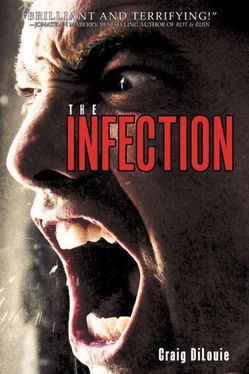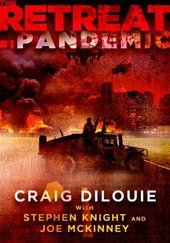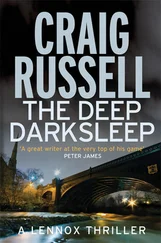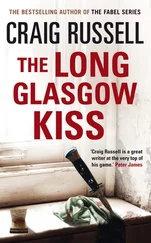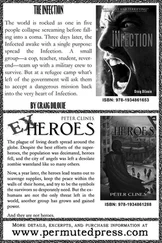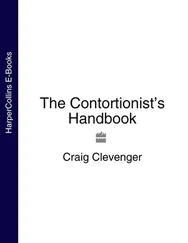He consults his map, a virtual city carefully drawn in madman scrawl, his to explore. He identifies the school, situated on a road that forms one of the camp’s major arteries used for motorized transport between the central hub and the distribution and health centers. He finds his new home, a speck in one of the endless shanty towns, revealed by a blotch of highlighter. Then he locates the nearest general market, where he intends to launch his career as a trader.
The other survivors are haggard, tired, broken. Just look at Sarge, he thinks, the man who fought a horde of screaming Infected by himself and saved our lives: damaged goods. Todd is young and taut and mentally flexible and much, much more resilient than he looks. If anything, the apocalypse has been almost kind to him. Already lean, he is starting to put on a little muscle and with it, more confidence. He feels powerful. He looks at the kids running by in packs and the soldiers passing around a cigarette and thinks: My generation will survive this. Will be defined by it. And we will define the age in turn.
♦
Paul hitches a ride hanging onto the side of a garbage truck as it grinds down one of the camp’s main arteries, raising a choking cloud of dust. The truck has been assigned to collect the dead for disposal. Its sides are decorated with crowded layers of outlandish graffiti, much of it incorporating grotesquely painted skulls and bones. He let the driver bum a cigarette and in return found out why the dead are burned in pits outside the city. The reason, he was told, goes back to the camp’s origins, when many people, raised on horror films, postulated that the Infected were zombies—hungry things that rose from the dead. Although it has been disproven, the practice stuck. Even if the people here want to bury the dead now, they cannot. There is simply not enough space.
A rock glances off of the side of the truck with a metallic boom, making Paul flinch. Another sails by close to his head, almost making him fall into the dust. The cab’s passenger-side window rolls down and a rifle protrudes, carefully sighting on a target among the tents.
No more rocks are thrown at the vehicle.
The truck lurches over the potholes, trembling in its metal skin. It makes three stops to pick up bodies lying stiff in the sun, their faces pale and their skin flaccid and waxy under sheets of plastic. For years, Americans sanitized death. Few people actually saw the dead in their natural state, bloated and drawing flies with their stench. They saw them laid out on velvet in fine caskets, dressed up in their best clothes, preserved like Egyptians.
The truck finally slows in front of a large wood church. A hand reaches out of the window and points to the front doors.
Paul jumps off, pounds the side of the truck to signal the driver that he can go, and waves. The hand waves back and the truck continues down the road.
Free of the truck’s exhaust, the camp’s ever-present smells of cooking, wood smoke and sewage return with a vengeance.
He breathes deep, figuring he might as well start getting used to it.
The doors are open and he walks in eager to do something.
Moments later, he finds himself staring down the barrel of an M16 rifle.
“Where do you think you’re going, Father?”
Paul frowns. “It’s Reverend, not Father, and I’m going to the place where I’ve been assigned by the authorities to live and work.”
“Let’s see your papers.”
The soldier studies his work papers while the rest of his squad glances at him curiously and then returns to their business. Paul ignores them and takes a look around. The church is filled with children sitting on every kind of chair in front of every kind of table—folding chairs, armchairs, office chairs, deckchairs, ottomans, benches, dining room tables, ping pong tables, nightstands, coffee tables, end tables, drawing tables and poker tables. The pews are gone, probably hacked up for firewood. A long line of sunburned kids holding bowls, spoons and mugs wait their turn to receive stew being ladled out of large vats on the altar in the domed apse, like a scene out of Oliver Twist . Their chatter fills the grand nave, rising up to the vaulted ceiling. They chew in the light of windows beautifully patterned with hand-stained glass.
“Hi,” a man in clerical garb says, approaching with his hand outstretched. The man is tall and skinny, his shoulders slightly stooped, and wears a neatly trimmed beard. “I’m Pastor Strickland. This is my church.”
“Nice to meet you,” Paul says, taking his work papers back from the soldier and shaking the man’s hand warmly. “I’m Paul Melvin. These kids are all… ?”
“That’s right. Orphans of Infection.”
“So many,” says Paul, staring at them. He has not seen a happy, living child in weeks and seeing so many here, eating good food in a safe place, warms his heart.
“These kids must be nourished and protected. They are our future. But they’re still wild animals, most of them. Don’t turn your back on them or leave your property unattended.”
“I’ll keep that in mind. But they seem pretty well behaved.”
“They have an abiding respect for the supernatural,” Strickland says with a smile. “They think if we find the right words, God will end Infection.”
Paul grunts, pleased. “That’s something I have in common with them. I’ll have to ask them what words they think will work.”
“I’m sorry, Paul. But you won’t be working here. You’ll be working down the street at the FoodFair handing out rations to the campers. Hard work, most of it, and thankless at that. Is that a problem?”
Paul shakes his head. He would like to work with the children, but it does not matter. “I just came here to work. I have to wonder, though.”
“Why do we need somebody like you to do that kind of work?”
“Something like that,” Paul admits.
“Ah, well,” says Strickland. “I’ll tell you. On a weekly basis, we hand out enough food to give each camper about twenty-one hundred calories a day. They get wheat, beans, peas, vegetable oil, fortified food such as a corn soya blend, some salt and sugar. If the camp gets its hands on some cattle, we can distribute a little beef, but that’s not all that often. The campers get no spices and most people can’t afford that kind of thing at the markets. Our fare will keep you alive, but it’s monotonous, as you can imagine, and people get mad after a while eating the same thing. Here’s something else. We try to give rations to women only because they are more likely to pass it on to other family members instead of selling it to buy something else. That naturally produces conflicts. Plus there’s the simple fact that we work for the government here, essentially, and a lot of people are resentful.”
“I saw people throwing rocks at a garbage truck today.”
“They are less likely to throw them at people in our profession,” Strickland says. “Does that answer your question simply enough? A lot of people have turned away from God because of what has happened, but they haven’t gotten around to blaming us for it yet. Most of the campers see us for what we are: people trying to help.”
“That’s what I want to do,” Paul tells him. “I want to help.”
“Then you’ve come to the right place. This camp needs all the help it can get.”
♦
Wendy enters the police station, a graffiti-covered building crowded with shouting people arguing with powerful, burly men wearing a variety of motley uniforms, from correctional facilities officers to private sector rent-a-cops. The building smells like angry men testing each other, a scent she knows well. She senses an atmosphere of simplicity and brute force here. The walls are plastered with wilting public health notices, camp edicts, duty rosters and poorly rendered carbon copies of missing persons sheets. Two bearded officers shove their way through the crowd, loading shotguns. Dogs sleeping on the floor raise their heads sharply as the men tramp out of the station. A man wearing a steelers cap, handlebar mustache and cashtown fire department T-shirt directs her to where Unit 12 bunks, the cost for this information a degrading moment of sexual appraisal. He does not care why she wants to know; he probably thinks she is somebody’s woman paying a visit. He watches her leave, spitting tobacco juice into a soda can.
Читать дальше
